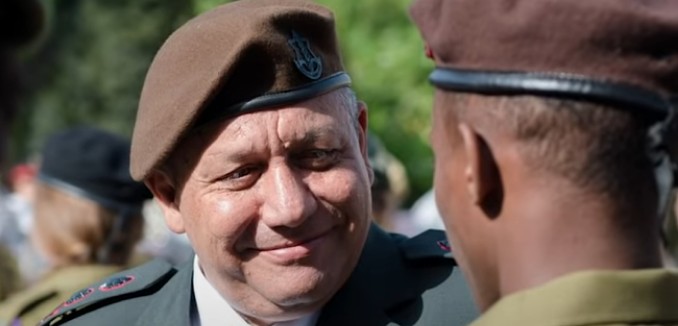Former IDF Chief of Staff Lt. Gen. Gadi Eisenkot told New York Times columnist Bret Stephens that during his tenure as Israel’s top soldier, Israel hit “thousands” of Iranian targets in Syria, the latter wrote in a column published Friday.
Eisenkot was describing Israel’s efforts to prevent Iran from establishing a foothold in Syria.
Originally, Israel focused on preventing weapons shipments from reaching Hezbollah. However, Israel’s strategy changed two-and-a-half years ago, according to Eisnkot. “We noticed a significant change in Iran’s strategy,” the former chief of staff recalled. “Their vision was to have significant influence in Syria by building a force of up to 100,000 Shiite fighters from Pakistan, Afghanistan, and Iraq. They built intelligence bases and an air force base within each Syrian airbase. And they brought civilians in order to indoctrinate them.”
By 2016, Eisenkot estimated, Iran’s Islamic Revolutionary Guard Corps-Quds Force (IRGC-QC) commander Gen. Qassem Soleimani had 3,000 of his own troops in Syria. They were supported by 8,000 Hezbollah fighters and 11,000 foreign Shiite fighters. In August 2016, an Iranian general boasted that the “Shia liberation army” being created in Syria had “the objective that, God willing, we will not have anything called Israel in 23 years.”
In January 2017, Eisenkot received government approval to increase the frequency of attacks against Iranian targets inside of Syria. Last year, Israel reportedly dropped more than 2,000 bombs on targets in Syria.
In May, Soleimani attempted to retaliate, firing more than 30 rockets at Israel. None successfully hit targets inside Israel. The Jewish State responded by striking 80 Iranian installations inside Syria.
“His error was choosing a playground where he is relatively weak,” Eisenkot said of Soleimani. “We have complete intelligence superiority in this area. We enjoy complete aerial superiority. We have strong deterrence and we have the justification to act.”
Stephens also noted that under Eisenkot, Israel has seemingly blunted the threat from Iran’s terror proxy Hezbollah. The columnist observed that factories Hezbollah had built to produce precision missiles “were publicly exposed” and that its terror tunnels have been destroyed.
As PM @netanyahu said – an #Iranian weapons depot in #Syria was #destroyed. See here #ISI preliminary BDA report. pic.twitter.com/pbfXp7fOB6
— ImageSat Intl. (@ImageSatIntl) January 14, 2019
Over the weekend, Israeli Prime Minister Benjamin Netanyahu took credit for destroying an Iranian arms depot located in Syria.
At the ceremony on Tuesday to install Eisenkot’s successor as chief of staff, Gen. Aviv Kochavi, Netanyahu said regarding Iran’s presence in Syria, “I’m telling you, get out of there fast. We won’t stop attacking.”
[Photo: Israel Defense Forces / YouTube ]




